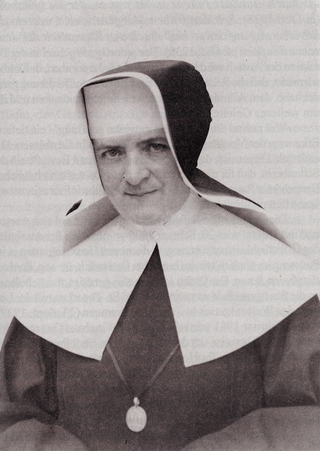Schwester M. Theodora (Flora Stefanie) Sperling SCB

Personalia
Order Name:
Born:
Died:
Profession:
Persecution:
Imprisonment 28.05.1943 - 13.06.1943,
Ravensbrück concentration camp 13.06.1943 - 25.07.1944,
Security money 1943
KZ Number:
Curriculum Vitae
Flora Stefanie Sperling is born in Haan (now Háj) near Dux in northern Bohemia, the daughter of a cutter (a person who removes animal carcasses) and a farmer's daughter. She attended the elementary school in Haan and Kötzschenbroda and the secondary school in Ossegg. At the age of 15, in 1910, she entered the Congregation of the Sisters of Charity of St. Charles Borromeo (Borromaean Sisters) at the motherhouse in Prague and was given the religious name M. Theodora. They send her to the k.k. German Teachers' Training College in Prague to learn the teaching profession. She completed her training in 1914 and began working as a primary school teacher in Warnsdorf. Shortly before the end of the First World War, on August 25, 1918, Sr. M. Theodora finally makes her perpetual profession.
After the break-up of Austria-Hungary, Sr. M. Theodora belongs to the German minority in the Czechoslovak Republic. In 1929, she completed her teaching qualification for secondary schools and became a teacher at the secondary school in Haid [today Bor near Karlovy Vary], where she was promoted to principal in 1932.
At the Munich Conference in 1938, the 'Sudetenland' was annexed to Hitler's Germany, whereupon Germany annexed it in October 1938. Sr. M. Theodora was immediately replaced as director by the new rulers. As early as February 20, 1939, the Catholic schools were deprived of their public rights and the Borroma nuns were forced to hand over the public school in Haid to the municipality. On September 13, 1939, Sr. M. Theodora was entrusted with the management of the orphanage in Tachau.
On February 4, 1941, she became provincial secretary in Georgswalde (today Jirikov) and in this function, in March 1941, she witnessed two of her fellow sisters (Sr. M. Leontia and Superior Sr. M. Febronia) being arrested by the Gestapo for listening to an enemy radio station at the order's branch in Ronsperg. Both sisters are subsequently deported to the Ravensbrück concentration camp. Sr. M. Theodora did everything she could to get her fellow sisters released, which she was ultimately successful in doing.
When the provincial superior died at the beginning of 1943, Sr. M. Theodora herself was entrusted with this function. While she was on a visitation on May 28, 1943, the SS searched her office and confiscated some letters. The provincial superior present was ordered by telegraph to the police in Georgswalde and arrested there. On June 5, 1943, she was transferred to the police prison in Warnsdorf and deported to Ravensbrück concentration camp via several intermediate stations on June 13, 1943. She was held in solitary confinement there until January 12, 1944. She was then first placed in Block 13 and then in Block 1, where the socialist resistance fighter Rosa Jochmann was also held. In Ravensbrück concentration camp, she contracted dysentery, which caused her to suffer from cardiac insufficiency, dropsy and a nervous disorder for the rest of her life. On July 25, 1944, she was finally released from the Ravenbrück concentration camp and returned to Georgswalde. As punishment, she had to hand over 1,000 RM in security money.
The Gestapo gave no reason for Sr. M. Theodora's arrest, but it can be assumed that she brought herself under suspicion with her efforts to get her two imprisoned co-sisters out of detention. Furthermore, the content of the letters confiscated by the SS is not known.
In Georgswalde, she also experienced the end of the war. Although the new authorities of the Czechoslovak Republic did not resettle her, the now Austrian citizen wanted to emigrate to Austria. In June 1946, she finally emigrated to Vienna to lead the reconstruction of the Borromean women in Austria. At Christmas 1946, she fell ill with jaundice and had to undergo gall bladder surgery. Due to her weak physical constitution caused by her concentration camp imprisonment, she did not survive the operation for long and died on January 20, 1947 at 5 a.m. in the hospital of the Barmherzige Brüder.
.
Citations
Mikrut, Jan (1999): Blutzeugen des Glaubens. Martyrologium des 20. Jahrhunderts (Wien)
